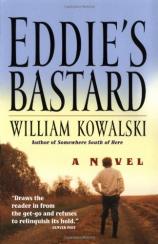Reading Group Guide
Discussion Questions
Eddie's Bastard

1. Billy's grandfather says, "Knowing the kind of people you come from is just as important as knowing yourself. In fact you can't know yourself if you don't know your people." Do you agree with this statement? How and what do we learn from our ancestors' actions and lives? Does information make us feel our limitations as well?
2. After his first terrifying confrontation with Annie's father, Billy realizes that he "had caught a glimpse of how the world could be sometimes and . . . that sight is horrifying to children." Discuss the impact that realizing the cruelty of Annie's father and the condition of her brother would have on a boy like Billy. Can you remember your first confrontation with life's cruel realities? What impact did it have on you?
3. What do you think of Billy's relationship with Elsie Orfenbacher? Do you think a boy can learn valuable lessons from uncommitted sex with an older woman? Should Elsie have put a stop to their relationship? What do you think Elsie teaches Billy about love and women?
4. Accompanying his grandfather to the home of an Amish family, Billy witnesses the traumatic birth of a baby and the death of its mother. Why do you think Billy's grandfather wants him to see this painful event? What does it teach Billy?
5. Discuss the character of Annie. Are you surprised at how Kowalski chose to develop her character? What does her lesbianism teach Billy? How would their relationship have changed if it had developed romantically?
6. What do you think of the way Billy is raised by his grandfather? How do you think Billy's character is shaped by his grandfather's alcoholism, his isolation from the community, and his "hands-off" style of parenting? Would Billy have been better off in a more traditional-style family, such as the Grubers? Why or why not?
7. Do you think Billy will go in search of his mother? Why do you think Kowalski chose not to pursue this aspect of Billy's story?
8. What is the effect of including Billy's novel within this work of fiction? What does it tell you about Billy? What did you learn about the process of writing from Billy's own experience?
9. Eddie's Bastard is filled with other examples of stories-within-a-story: Grandpa's experience in the war; Willie Mann's diary; the story of Billy's father, Eddie. To what end does Kowalski employ this technique? Is it effective?
10. In his diary, Billy's ancestor wrote that Americans "have practically no history. . . . We have only our present, which we are continually creating and recreating." These words were written centuries ago -- do you believe they are true today? How are Americans at an historical disadvantage -- or advantage -- because of the relative newness of their country?
11. As a group, discuss stories that have been passed down between generations in each of your families. What kinds of stories are they? Is their purpose to teach or to entertain-or both?
12. How does Eddie's Bastard compare with other coming-of-age stories you have read? How and why is it different?
Eddie's Bastard
- Publication Date: September 19, 2000
- Paperback: 384 pages
- Publisher: Harper Perennial
- ISBN-10: 0061098256
- ISBN-13: 9780061098253







